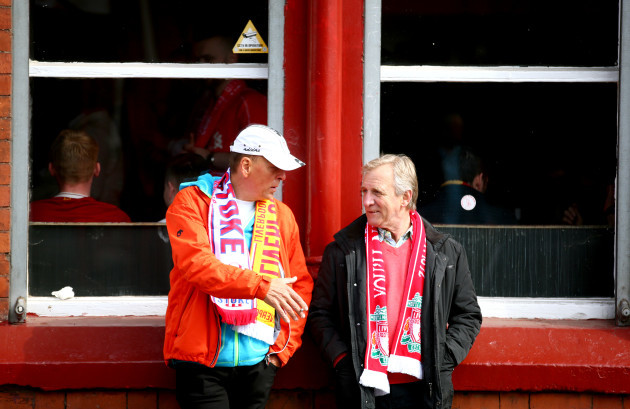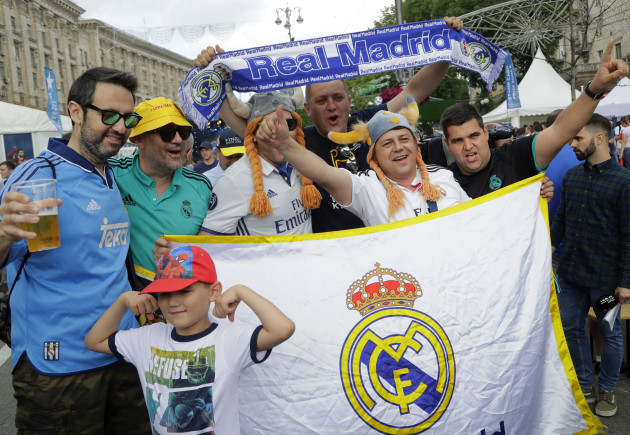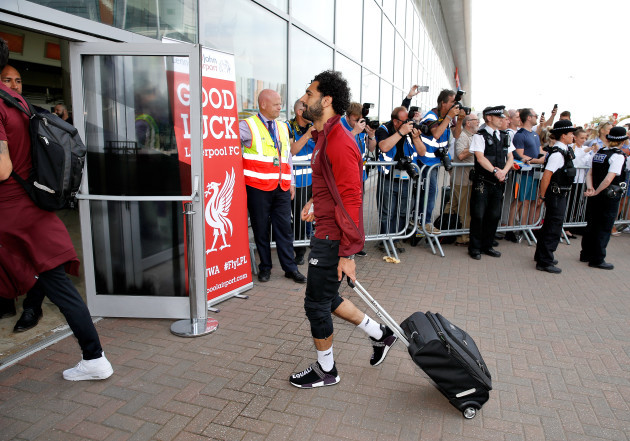The song rang out loud and clear in both legs of the semifinal against Roma; you will hear it, again and again, during Saturday’s final in Kiev, the biggest stage club soccer has to offer.
That night, Righi will be expecting a slew of new messages from friends, sending him clips of his song booming out in Ukraine, sung by fans of an English soccer team, who picked it up from a YouTube video of Portuguese ultras singing in Germany, who took it from Naples, who borrowed it from L’Aquila.
“Every version gives the song a new life,” he said. “It is very emotional for me. It makes me very happy. I always think that songs are like children: When they become big, they leave home, and they go their own way.”
This one has gone farther than most. It has conquered all of Europe. It’s never going to stop.
Ayre was not a popular figure on Merseyside but he did listen when Byrne came to him. “Clubs are generally quite suspicious when activists got to them asking for help but we explained to them there was no trap door. We wanted to access 45,000 fans every week. If we did that, we’d crack it. Foodbanks shouldn’t be in existence but we knew that with the help of the football clubs, we’d be able to make the lives of a lot of people a little bit easier.”
Foodbanks were now on the footprint of Anfield and Goodison Park on match-days. Both clubs gave access to their official social media channels and websites, promoting the scheme. “The reach is enormous,” Byrne says. “This season we have targeted six games in particular to go big on. During those games, emails are sent out to all Liverpool season ticket holders and fan card holders. It means the majority of people going to Anfield know exactly where the foodbank is. The level of support from both clubs has made a huge difference.”
The link between club, city, family and the individual was highlighted when it was established that at least one of the stewards at Anfield, who had helped with collections, was having to access foodbanks for his own in order to support himself. Premier League football clubs are not shy in advertising their positive deeds, as they attempt to show that corporate multinational businesses do, in fact, care about the local communities they exist in. It is easy to be cynical about the motivations behind impacts made, but on this occasion the process is a necessity as much as it is genuinely considered. In adversity, collections are helping unite groups who are separated by sport or religion but brought together by common struggle.
Jurgen, however, was most drawn to football and ultimately signed a professional contract with FSC Mainz. He started as a striker but retreated toward his own goalkeeper as his career progressed, ending up as a centre-back. A fierce desire burbled along during his career, and occasionally boiled over. In 2005, he agreed to be hooked up to a lie detector for an interview with RUND magazine:
Shortly before I was made manager [of Mainz], I head-butted a very good friend of mine, Sandro Schwarz. He had twice put me on the floor in training. I got up, all I could see was his face in front of me, and then he was down on the ground… I just wanted to die. I couldn’t bear the thought of what I’d done.
Wolfgang Frank coached Klopp at Mainz, and became the man who had the greatest tactical influence on Klopp. Frank somewhat crudely explains this loss of control in the context of Klopp’s relative lack of talent: “Sometimes he lost control out on the pitch because he had many good ideas in his head, but not the footballing talent to act upon them”. Klopp, however, agrees. “I never succeeded in bringing to the field what was going on in my brain. I had the talent for the fifth division and the mind for the Bundesliga. The result was a career in the second division”.
Those close to the Anfield camp say there is a “real 2004-05 feel” about the place, with that faith only further fired by Jurgen Klopp’s psychological management, the nature of their surge to the final and the belief this is “their” trophy.
Those at Real Madrid respect that, but can just as easily dismiss it, in the way they do to most challenges. No one, after all, believes like Real do. No one can believe like Real do. No one can lay a claim to this trophy like they can. If it’s anyone’s trophy, it’s theirs.
The sheer arrogance from decades of that success and specifically that special haul of 12 European Cups just energises the entire club. You can sense it as you walk through the appropriately grandiose surroundings adorned with appropriately grandly-dressed supporters.
They are the opposite of Barcelona in that way, too. While the Catalans have always been undercut by an underlying neurosis about the next potential crisis, something that Johan Cruyff referred to as “the eternal storm”, Real have always been built on their overwhelming assurance.
It is why Marcelo’s comment ["Obviously what happened to Barcelona wasn’t going to happen to us, because we're Real Madrid"] best explains the club, and this spell of Champions League success, in a way nothing else can. So much of it does after all seem unexplainable, when you properly consider the facts.
Like a mid-20s Ronaldo, Salah is a power-runner with wonderfully quick feet and the ability at his best to basically make the game up in front of him. Salah is yet to reach anywhere near the same heights. But in his best moments he looks a bit like a product of some advanced gene-splicing Ronaldo-Messi experiments: the body of a shaggy-haired, left-footed jinker, but the direct style of a sprinter, a cutting edge rather than a playmaker.
In Kiev, Salah and Ronaldo will once again be key to the attacking tempo of the competition’s two highest scoring teams. There has been a slight adaption with Madrid. These days they like to push you back and keep possession, to load balls into the box knowing Ronaldo will eventually find the tiny pocket of air he requires to combination punch the ball into the back of the net.
With Liverpool the best moments have all been about the surge and the blitz, led so often by Salah. The Olympic Stadium was originally known as the Red Stadium of Trotsky, and after that as the just the Red Stadium. The ability of the team and their fans to turn the air red on Saturday night, to generate that shared driving energy, will be key to Liverpool’s chances.


